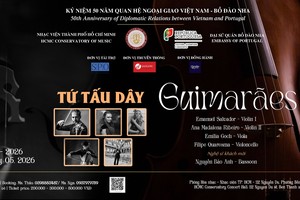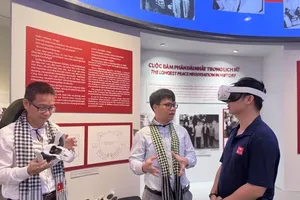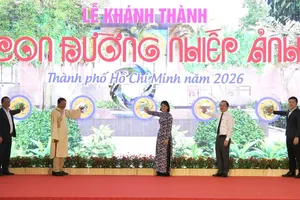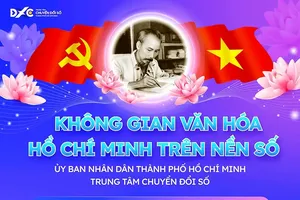
This is a positive and necessary step, given the current chaos and lack of regulation in this sector. While other countries have long-standing management models, Vietnam will need to adapt these lessons to suit its own unique context.
Lessons from other countries
At a recent forum on 'Building Digital Trust' organized by the National Cyber Security Association, Head of the Department of Cyber Security and High-Tech Crime Prevention (A05) under the Ministry of Public Security, Lieutenant Colonel Nguyen Tien Cuong stated that Vietnam is drawing from international experience to leverage the role of KOLs and KOCs in both national security and socioeconomic development.
In the U.S. and Europe, transparency and professionalism are paramount. Influencers must undergo training to ensure they create responsible content. China has adopted strict penalties for violations. Thailand treats being a KOL/KOC as a legitimate profession that requires formal training for sustainable development.
Deputy Director Nguyen Thi Thanh Huyen of the Department of Broadcasting, Television, and Electronic Information under the Ministry of Culture, Sports and Tourism, added that in China, KOLs are seen as cultural, social, and lifestyle icons for the youth. As such, managing them is a central focus of cultural and ideological governance, requiring both 'proper management and proper use.'
In this massive market, KOLs must be transparent and cannot blur the lines between advertising and personal reviews. Violators face severe penalties, ranging from administrative fines to imprisonment. The most serious punishment is being 'blacklisted' or 'fengsha' (not being allowed to appear on any media platform). Many KOLs have been permanently or temporarily blacklisted, effectively ending their careers.
In South Korea, influencer management started even earlier. Celebrities are highly susceptible to public backlash because they are considered role models. The management of KOLs is not handled by a state agency, but rather by media and television networks that impose rules and boycotts. Over the past two decades, many celebrities have been boycotted for periods ranging from a few years to a lifetime.
Various other countries also have diverse approaches to managing KOLs. In the U.S., the Federal Trade Commission (FTC) requires all KOLs to disclose when they receive compensation or benefits for promoting a product or service. They must use clear hashtags like #ad or #sponsored to indicate that a post or video is an advertisement.
The U.S. Federal Trade Commission (FTC) enforces its principles across all media platforms, extending beyond popular social networks like Facebook, Instagram, and YouTube. In addition to issuing warnings and fines, the FTC also provides public guidance to help violators correct their actions in compliance with regulations, contributing to the overall development of the industry.
International regulatory frameworks:
South Korea: The Korean Fair Trade Commission (KFTC) mandates that all paid content must be explicitly labeled with hashtags such as #ad or #sponsored.
United Kingdom: The Advertising Standards Authority (ASA), the UK's advertising industry regulator, provides detailed guidelines on the conduct of Key Opinion Leaders (KOLs) and Key Opinion Consumers (KOCs), clearly outlining violations and corresponding sanctions.
CEO Nguyen Lam Thanh of TikTok Vietnam pointed to Thailand's 'all-people creative program' as an example of a nation treating each family as a source of soft power to enhance societal skills. In contrast, while millions of active TikTok users in Vietnam have paid taxes, KOLs and KOCs are not yet recognized as a formal profession. This lack of official status has led to a fragmented payment structure and a general lack of professionalism within the sector.
Building digital trust and professional standards for influencers
The establishment of the Digital Trust Alliance and the Influencer Trust program marks a significant step toward professionalizing the Key Opinion Leader (KOL) and Key Opinion Consumer (KOC) landscape in Vietnam. These initiatives were launched during the conference 'KOL with the Era of National Rise,' to foster a more trustworthy digital environment.
The Digital Trust Alliance is a collaborative platform bringing together KOLs, government agencies, digital platforms, businesses, and the press. Its purpose is to combat misinformation and deceptive advertising while promoting positive values within the community.
Simultaneously, the Influencer Trust program is designed to create a system for evaluating the reputation and social responsibility of KOLs and KOCs. This framework provides the public, businesses, and platforms with a reliable basis for identifying and partnering with influencers who genuinely spread positive and credible content.
According to Lieutenant Colonel Nguyen Tien Cuong, this unified approach fosters a common voice and collective effort, which will be highly beneficial for all members. He noted that for KOLs and KOCs, joining the alliance provides formal recognition of their professional reputation, a crucial endorsement for their careers.
MC Khanh Vy, a prominent content creator, believes the Digital Trust Association offers a valuable direction for her peers and acts as a bridge connecting them with digital platforms. She stated, 'I believe my responsibility is to share the values that I am passionate about and that I love.' She also emphasized the importance of ensuring brand partnerships align with her personal values and underscored the fundamental responsibility of upholding the law and respecting her audience.
In late August, the Digital Content Creation Association (KLIC) was officially launched under the Vietnam E-commerce Association (VECOM). KLIC is the first professional organization dedicated to creating a structured development environment for digital content creators.
President of KLIC Dao Thi Nuong stated that the organization was founded on five core values including integrity, responsibility, kindness, connection, and value. By 2030, KLIC aims to have over 3,000 members and train more than 10,000 individuals through its EcomHUB program—the first legal and e-commerce business training program sponsored by KLIC and VECOM. This initiative seeks to build a systematic and professional culture in the industry.
























